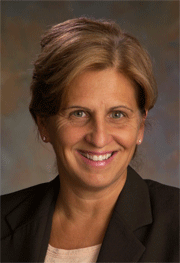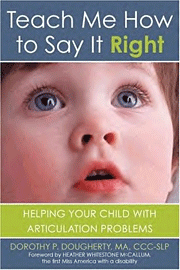Interview with Dorothy Dougherty, Speech Language Pathologist and Author of"Teach Me How to Say it Right: Helping Your Child with Articulation Problems"
Share:
Beck:Good Morning Dorothy. It's a pleasure to speak with you. If you don't mind, I was wondering if you'd review a little of your professional history and education with me?Dougherty:Sure, Dr. Beck. I obtained my bachelor's degree from West Chester University in Pennsylvania, and my master's degree
 Beck:Good Morning Dorothy. It's a pleasure to speak with you. If you don't mind, I was wondering if you'd review a little of your professional history and education with me?
Beck:Good Morning Dorothy. It's a pleasure to speak with you. If you don't mind, I was wondering if you'd review a little of your professional history and education with me?Dougherty:Sure, Dr. Beck. I obtained my bachelor's degree from West Chester University in Pennsylvania, and my master's degree from the College of New Jersey. I have worked with children and adults in school, clinical, and private settings for over 29 years. I am a member of ASHA and the New Jersey Speech and Hearing Association.
Beck:Excellent! Dorothy, please tell me what inspired you to write this book?
Dougherty:Through my work as an SLP, I found that there wasn't a lot of focused and easily retrievable information available for parents of children with articulation disorders. I thought that this information was really needed as it is the most common communication problem: three out of five of all speech and language disorders are related to articulation problem. When a parent has a basic knowledge of speech-sound disorders, it may make them feel more comfortable when speaking to their pediatrician or a speech/language pathologist, and also encourage them to get help sooner rather then later.
Beck:You're right. I think it can be frustrating for moms and dads to have to wade through tons of speech, language and cognition issues, when they really wanna just focus on articulation issues.
 Dougherty:Exactly. The book serves as a "one stop shop" for parents of children with articulation issues and disorders. How speech sounds develop, how to recognize developing speech problems, how to help children make the most out of speech therapy, and understanding a speech/language evaluation are all included in Teach Me How to Say it Right. It also provides parents with fun activities to help develop and enhance their child's language and articulation skills.
Dougherty:Exactly. The book serves as a "one stop shop" for parents of children with articulation issues and disorders. How speech sounds develop, how to recognize developing speech problems, how to help children make the most out of speech therapy, and understanding a speech/language evaluation are all included in Teach Me How to Say it Right. It also provides parents with fun activities to help develop and enhance their child's language and articulation skills. Beck:All important issues, thank you. What about stuttering? I get a ton of e-mail from parents of children who stutter and from people who stutter, and I wonder, do you consider stuttering to be an articulation disorder?
Dougherty:I consider stuttering and articulation to be speech sound disorders. I also get a lot of stuttering questions. Parents are often worried and confused about normal nonfluencies vs. stuttering. This makes sense, because many times children who are beginning to stutter sound similar to children who are going through a period of using normal nonfluencies as they learn to talk. It is really important for parents and caregivers to create a fluency-enhancing environment around any child who is learning to talk and make sure that the child continues to see talking as a wonderful and rewarding experience.
Beck:Very good. What can you tell me about childhood apraxia? Seems to me it has become more and more common in the last 5 years or so?
Dougherty:I believe childhood apraxia is common and it is really important to make the correct diagnosis at an early age. Sometimes, particularly with a very young child, it is difficult to determine if it is a speech/language delay or apraxia. It is important that if apraxia is even suspected that the child participate in diagnostic specified therapy for apraxia. I have found that frequency of therapy and parental support are most important.
Beck:So can we think of childhood apraxia as a problem of executive function?
Dougherty: Yes, these children don't seem to form or be able to access the speech motor plans that come easily to most children as they learn to talk. They need frequent one-on-one therapy and lots of motor-sensory techniques and repetitions of sounds and sequences. This again confirms intensive therapy at a young age is so important to train the brain to make saying sounds and sequences automatic.
Beck:Dorothy, would you comment on the traditional expectation that children progress in a sequential pattern from listening to speaking, and from reading to writing?
Dougherty:I believe the latest research is changing this traditional expectation. New research indicates children actually are mapping out the sound system of their native language in the first 6 weeks of life, which is quite amazing! We know that as they map out these sounds and phonemes, the quality of their mapping sets up their phonological system and impacts their ability to read when they are developmentally ready. For appropriate and normal phonological awareness to occur, the child needs to hear sounds clearly and repetitively. Talking, reading aloud, singing, lots of conversations in early infancy will set the groundwork for reading, writing and later academic success.
Beck:Dorothy, many people write to me regarding their child's articulation issues, and although I usually tell them to contact their local SLP or ASHA, I wonder if you have other referral ideas for moms and dads that need help? What do you tell parents regarding how to find an SLP?
Dougherty:I always stress to parents that if they have any questions or concerns about their child in any area of development at any age, it is important to seek professional help. Don't wait if you have questions or concerns, and, especially, don't wait until your child is in public school. Yes, ASHA and your local SLP are very helpful. But also, if your child meets your state guidelines, free services are available from birth to five. If your child is two years or younger, you can call your local school district for a referral to the Early Intervention Services in your area or find listings in your county by looking in the government pages of your phone book under Education or Health Department. If your child is three-five years of age, you can call your local school district for a screening. Also, SLP's work in hospitals, speech and hearing clinics, and colleges or universities. Ask your pediatrician for a recommendation, or a family member or friend for a referral. If you have trouble finding someone in your area, you can also consult the National Information Center for Children and Youth with Disabilities (www.nichcy.org). They will provide contacts in your area.
Beck:Dorothy, it has been a pleasure speaking with you. Thanks for your time.
Dougherty:Thank you, Dr. Beck. It's been a pleasure for me, too.
"Teach Me How to Say it Right: Helping Your Child with Articulation Problems"
ISBN 1-57224-403-8
www.1speechproblems.com
www.newharbinger.com
